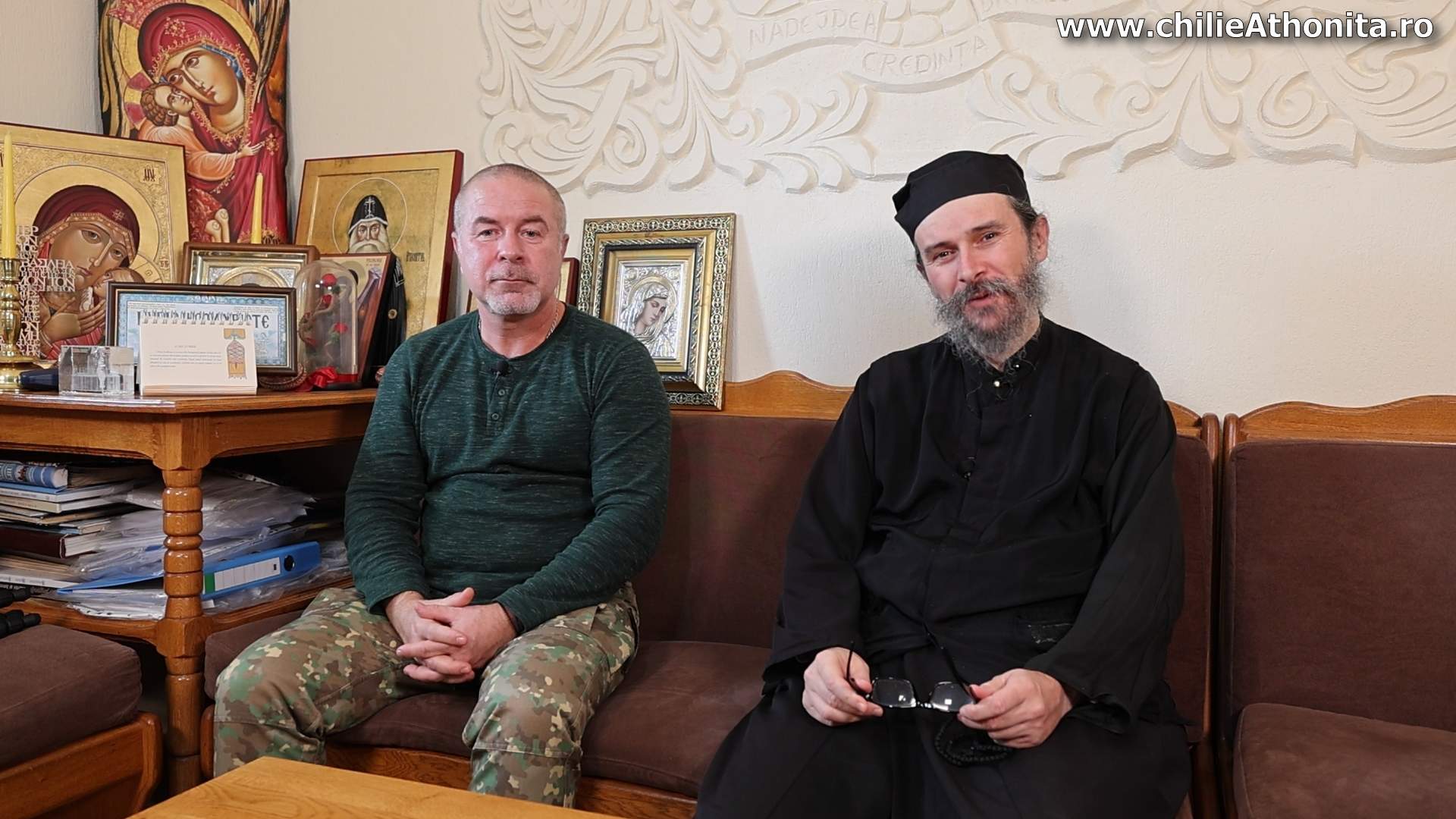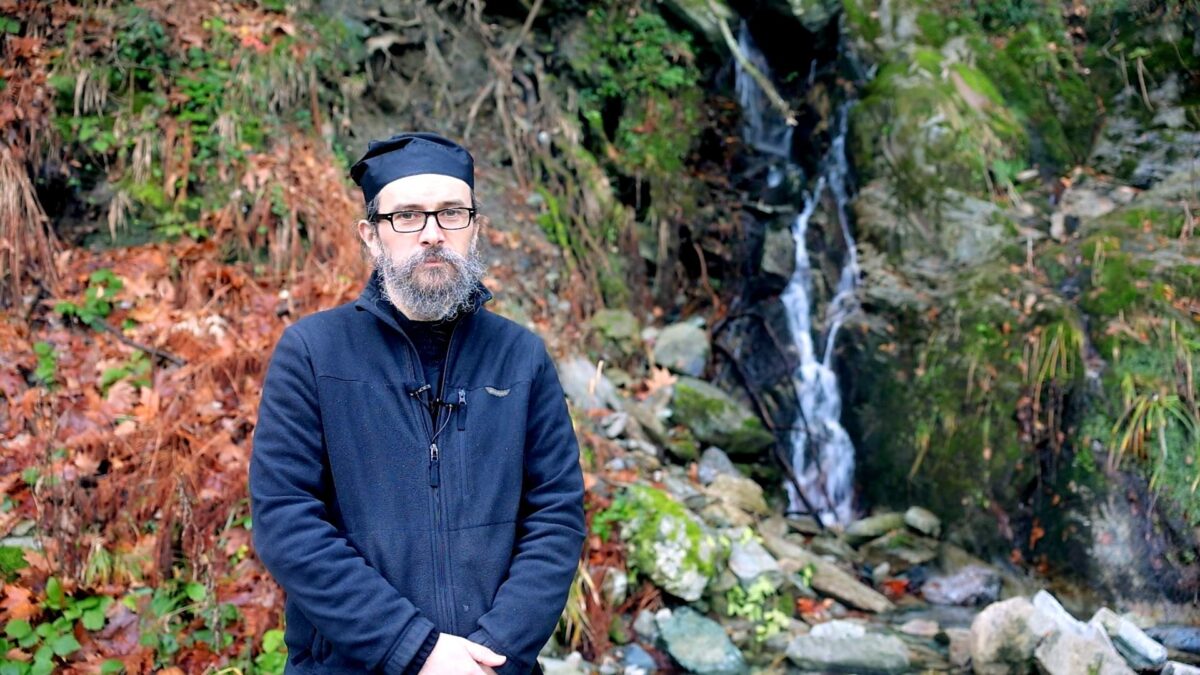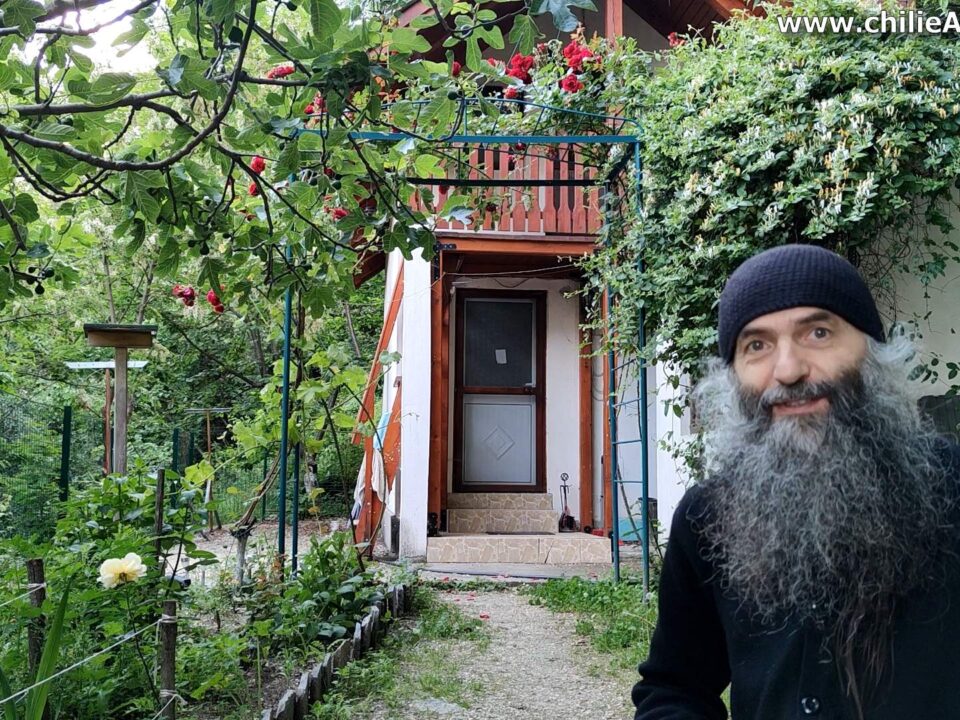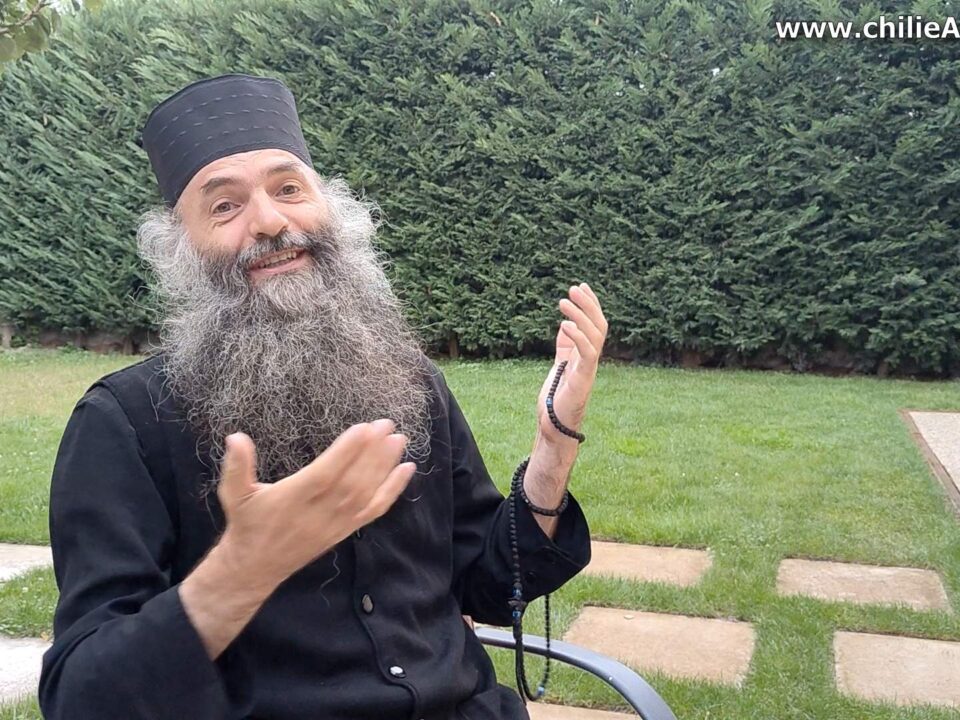
In Retrospect: What Do We Offer in the Future? – Cristi Bumbenici, Fr. Theologos
15 January 2023
“Windows to the Soul”, With Father Pimen (Mount Athos) – “Let Us Feed on the Joy of Faith!”
19 January 2023What is the first temptation for each of us?
After His baptism, the Lord was led by the Spirit into the wilderness where he was tempted by the devil with three temptations. What was the first? …and what importance does it have for us? How can we overcome it? How can we guard our minds?
You will find the answers to these questions and others by watching this video.
Enjoy!
Glory to the Father, and to the Son, and to the Holy Spirit, now and ever and unto ages of ages. Amen. Through the prayers of our Holy Fathers, Lord Jesus Christ, Son of God, have mercy on us! Amen.
After His baptism, the Lord was led by the Spirit into the wilderness. As both the Gospels of Matthew and Luke describe in Chapter 4, the Lord did not eat anything for forty days and afterward felt hunger. During this time, the Lord prayed, faced temptations from the devil, was among the wild animals, and angels served Him.
From these few verses alone, we can already say a lot. In fact, the Lord reveals the beginning of spiritual life, you should know that. The forty-day fast in the desert achieves man’s withdrawal from a fallen state, where our attention is often on matter and material things. This is why we fast, brethren. Fasting, at its core, is about pulling the mind away from the senses, uprooting the mind from the senses, and for this, we must cut off the triggers that excite and overwhelm our senses, which assault a person and draw his mind toward sensory stimuli. We need to detach our minds from these distractions, right?
When the thought arises to see what’s over there [say]: “No, I won’t see what’s there!” To see what’s beyond [say]: “No, I won’t see what it is!” When tempted to taste: “I won’t taste it!” To hear what is being said [say]: “I won’t listen to what is being said!” Do you understand? Why so? Because the mind is the eye of the soul, and our ultimate focus must always be directed toward the eternal personal perfection—toward God, our model to follow. Christ came for this very reason: to show us a concrete example of how we should behave as humans. Meaning, to see Christ concretely, brethren. Right? What we should do.
The issue of the senses is complex, for man is fallen under the senses and relies on them. He shouldn’t, but it happens. Man is drawn to worldly pleasures. Instead of using his senses to approach the light of God—keeping his mind’s eye steadfast on that light to avoid losing his way—this eye strays, deviates in any flood of information that comes through the senses, and considers this flood a pseudo-deity, a momentary idol. Nearly all, if not all, of our attention is consumed by what we see, hear, taste, smell, or, worst of all, touch. God forbid! As you can see, we have countless sources of pleasure. For this reason, we need pain, enough pain, a corresponding pain of our hearts to break free from there. Meaning, we need repentance, brethren. You see that the Gospel begins with repentance.
The Gospel does not start with Matthew, where it says, “The book of the genealogy of Jesus Christ, the son of David, the son of Abraham” because in fact Holy Apostle and Evangelist Matthew actually addresses the Jews, aiming to prove that Jesus, son of Mary, is indeed the awaited Messiah. In contrast, Saint Luke writes for the Hellenistic world, primarily for the Romans, providing a well-crafted theological, scientific, philological and artistic exposition – if you will – illustrating the transition from the old Mosaic law to the new law of our risen Lord, Jesus Christ. In St. John the Theologian’s we clearly see the theological masterpiece of the New Testament, focusing on the divine side, the incarnate divine nature of the Lord, a nature that transcends the space-time continuum.
As St. John states in the first verse of his Gospel, “In the beginning was the Word…” This signifies that at the very moment the space-time continuum was created from nothing, God the Word already existed. That’s what he’s referring to. The Gospel – that is, the good news of our salvation – I don’t know if you know, Ευαγγέλιo, Ευαγγελία – in Greek, means “good news” – the Gospel, as I was saying, begins with Mark. For the first verse says: “The beginning of the Gospel of Jesus Christ, the Son of God.” Immediately following this, he references John the Baptist, saying: “Behold, I send My angel before thy face, who will prepare your way before you, the voice of one crying in the wilderness: Make ready the way of the Lord, make His paths straight.”
Then, what is the beginning of the Gospel? The answer lies in the verses that follow, “Repent, for the Kingdom of Heaven is at hand!” Everyone went to the Jordan to be baptized by St. John the baptism of repentance for the forgiveness of sins. Repentance signifies a turning away from pleasure through the pain of the heart. St. John was imprisoned and then Christ came, saying exactly the same words: “Repent, for the Kingdom of Heaven is at hand!”
Thus, the beginning of our salvation is repentance—the painful extraction of our minds and attention from the centers of pleasure that besiege us. That’s a task we must undertake constantly, brethren. To heal our fragmented attention, crumbled by the incessant flow of information, we must cut it off as much as possible. This is what fasting is, brethren, particularly the fast from food, which the Church specifically emphasizes. Why is this so? Because beyond the fact that it is the easiest to manage, it impacts not only the mind as a center of deviant magnetism through the sensations it provokes on it, on attention, but also serves as a source of energy for the body.
As we know, the body seeks material things, waging war against the spirit, and the spirit against the body, as St. Paul writes in his epistle to the Galatians. Well, if we offer the body more energy than it needs, then this enemy of our mind will gain strength and will draw the mind – weak after the fall – away from God, into corruption, as the same St. Paul also writes in the epistle to the Galatians. The spirit gives life, as the Lord Himself says and that’s why we must keep the body in check; otherwise, the body will lead us into an uncontrolled and irrational chaos.
The spirit is rational, brethren, and so is the mind. Consider that the body is weak, but beware! It’s also weak when it’s too well-fed, brethren. It cannot control itself, and acts chaotically, irrationally, animalistically, wanting even more food, even more sex, despite its limited capabilities. Besides this, physical pleasure arises from chemical reactions, brethren, I think you know, I won’t insist on it… with some enzymes present there, dopamine, serotonin and so on. Due to the fact that, as I was saying, it’s about these chemical reactions, the human being is never fulfilled [by this]. Never.
The chemical reaction has nothing to do with the human being. The human being is above that. Because of the fall we are influenced by this. Bodily passions are meaningless – it’s chemistry. The person addicted to sex, drugs, alcohol, eating too much, or other bodily passions, feels that fulfillment, the true life is lacking, which can only come through the eternal union with the perfect communion of the perfect Persons of the Holy Trinity.
Think of this fulfillment and happiness that surpass any description, compared with the entanglement, the hardening, the collision with the wall that flattens in the attempt to go indefinitely into bodily passions. Remember how Romans at their feasts would eat until they couldn’t anymore, only to induce vomiting so they can eat again. It’s dreadful, brethren! Senseless, as I’ve said. Flattened, paved over. Do you understand?
These are things we can express, but there are also things that cannot be spoken—shame lies in such utterances, as the apostle says. Related to the body. You know what I am referring to. Consider how these actions enclose the soul within a carnal prison which is too tight for it, and the mind is tortured, being darkened by this viscous thickness full of chaos and turmoil, a rough and violent thing of the flesh, in contrast to the delicate and fluffy softness of spiritual love.
As St. John Damascene says, any spiritual pleasure surpasses all carnal pleasure. Brethren, God gave us our senses to gather ourselves away from them and, with their help, through a unified mind, to discover the Creator of all and the Lover of all, beyond the complexity and division of this world, because, you know, behind all these many things lies the Lover and Provident (i.e. the Carer) of all, much like how the same diamond is hidden behind it’s many facets.
We must go to the diamond, brethren. Let us not remain at the surface, at the facade. If we cling to creatures or, worse, to our distorted pleasures, we are doomed to fragment into countless beings, losing our purpose. Our meaning is found in God; we are made in His image. You know, this is like a shattered mirror, broken into fragments, from which the image of God has vanished. It reflects nothing because it cannot reflect anything, being shards. Do you understand?
The gathering of man from these shards is done through leaving the world, from the influence of these dispersive centers. To rebuild the global Adam, we must first rebuild ourselves. For this we need to withdraw from the noise of modern life—brethren, we must spend some time without our phone, computer, television, news, or worries, in the desert of this world. Let us be just us and God, for otherwise, we will not find our integrity under the bond of spiritual love. We must be alone with God.
You see that our Lord Jesus Christ maintained His integrity through the love of God, even when the demand of matter, meaning, the need of the body pressed Him to submit to it and turn stones into bread by Himself, in an egotistical way, to succumb to the need for selfish wealth. Notice that the devil did not say, “Pray for God’s help,” as one should. He didn’t suggest, “Pray to God, then go somewhere and ask or buy something to eat.” Instead, he pushed Jesus into the harshness of self-sufficient, anarchic, egotistical self-will, severed from God under the pretext of the biological need for food. In other words, to fend for Himself.
What’s striking is that the devil said, “If you are the Son of God, tell these stones…” This reveals that the enemy sees the relationship between the Father and the Son not as one of love and unity, but as a usurpation of power—a rupture from the Father’s love— i.e. if I have power to break away, I leave home and command stones to turn to bread. Yes, because the devil doesn’t know what love is. He seeks to dominate Jesus, urging Him to be prideful and submit to the passion of pride. The devil wants Him to prove His divinity needlessly just through a free display of force, to demonstrate that He is the Son of God, the greatest of all. That’s what the devil wanted.
Do you understand? Actually, the devil doesn’t even know what humility, temperance is. Notice that he didn’t mention a single stone or something small; he referred to “these stones,” implying abundance – like those around me – to make a fortune, to have barns, to rely on material possessions instead of trusting in God’s care. For wealth to become His god and savior. To turn into a pseudo-son of God, estranged from His heavenly Father. Do you understand? Christ acted as the Son of God, as He truly was, but without openly showing Him that He was the Son of God.
He defeated him through the spirituality and self-control that maintains man in his complete relationship with God. You see that, as the Holy Fathers teach us, the three great passions are: the love of pleasure, the love of wealth, and the love of power. Pleasure, wealth, power – PWP – remember this, brethren! From the temptations in the desert, it’s clear that the devil’s the principle of matter, while God is the principle of spirituality.
Through his words, the devil seeks to draw Christ—and us, of course—toward the love of material wealth, which breeds pleasure: “Many loaves are miraculously made for my benefit,” and power: those who possess (wealth) loaves, food, gain strength. Regarding how this thought comes and how the devil tempted Him, we see that the bait, meaning the attack, is one thing — what the devil tells Christ — while companionship is another thing, that is, if the Savior began to analyze that thought. The struggle is something else—if the Savior were to say, “I think it would be good…” and so on. Another thing is the passion and another thing is consent, which is close to deed and resembles it, of course, and another thing is the work, the deed, and another thing is bondage. The bait is a thought introduced simply by the enemy, such as the devil’s command to our Lord and God: “Command these stones to become bread.” Do you understand? This is the bait. This, as I said, is not dependent on us.
In the case of the Savior, the devil was free to tempt Him. But companionship is the acceptance of the enemy’s whispered thoughts, engaging with them, and our will’s pleasant conversation with them. The Lord rejected this! Passion is the habit of entertaining the enemy’s thoughts, born from companionship and from the relentless spinning of our thought and imagination around him. The struggle lies in resisting the thinking, either to extinguish the passion from the sinful thought, or to consent to it, as the Apostle says: the flesh desires against the spirit, and the spirit against the flesh; they oppose each other. Now, regarding enslavement, this is the forced and unwilling forcing of the heart, dominated by prejudice and long-standing habits. Consent is the agreement with the passion in the thought. And the deed, of course, is the fulfilment of the sinful thought that has been approved.
The devil always seeks our consent to the passion in our minds. Know that! Regarding the deed, note that the Savior actually multiplied the loaves much later, not for His glory, but because the people were starving, eager to listen to Him. Indeed, the people wished to make Him king, and He hid from them. He ran away. If He had thought devilishly, logically, He would have used this “very good” opportunity to become king, seize power, and lead the Jews into battle against the Romans, issuing orders. But that would not solve the human problem, brethren. On the contrary, it would have worsened it. It would have intensified the conflict among us, the harshness between us, hardened our inner world even more, all for a pseudo, devilish joy—that we are greater than others, that we could show them. The possibility of a false victory, by force, is very real because Christ is God, right? Almighty. Therefore, Christ could have done that.
Remember in the last chapter of the Gospel of John, the Lord created bread, fish and fire from nothing. A true feast, brethren! Recall at the Sea of Tiberias when the Savior walked alone by the shore, and the Apostles did not recognize Him. The Savior asked if they had any food, and when they said no, He sent them to fish. They repeated the miraculous catch of fish, the same miracle that had called them to the apostolate, and then St. John the Theologian recognized the Lord. The Apostles returned to shore to find Him with fish, as I said, with fire, and everything else. Out of nothing. But you see that the Lord does not wield His superiority to crush them, say; instead, He tells them, “Bring some of the fish which you have just caught.” With gentleness and paternal love.
And do you see? He made food out of nothing providing just enough for Himself and for the Apostles, while generously gifting the abundance to His Apostles, in the Miraculous Catch that it’s actually symbolizing the harvest of the Church, brethren, the Savior is truly frugal. In fact, brethren, we need not be greater than others; we must be softer, because hardness and obstinacy are but a taste of hell. Our goal is not to win the war but to achieve peace. Christ came to transform the inner man, not to impose some better external order through force. True freedom springs from within, from liberation from passions, from knowing Christ, the Truth. The Lord said, “You shall know the loving Truth, and the Truth shall set you free.” When we experience the Truth—when we feel the love of Christ— our minds are no longer swayed by the passions through the senses – it fasts from all, brethren. Then the mind is free and stands upright. It is no longer drawn upwards by pride, nor driven downwards by despair, nor tossed to the right by surplus nor to the left by a lack without discernment, but stands upright, centered on the cross, united with Christ, and illuminated by the rays of the understanding light that comes from God.
This is justice, brethren: freedom from passions. This is also the purity of the mind because it is free from all that is foreign to its spiritual nature, meaning, it is pure of everything bodily, driven by passion. When the mind is free from passions, it becomes illuminated and perceives correctly, because the mind is an organ of sensing, as St. Diadochus of Photiki teaches. This clarity of mind, unclouded by passions and bathed in divine light, is what we call good sense, brethren.
I have said it before and I repeat it: we must cherish this good sense, brethren, that it may not be lost, for it’s the daily manifestation of God’s grace. Be careful, however, because this perception is delicate. It requires a lot of experience and peace to discern thoughts. Above all, however, God’s grace is needed. God’s grace comes through a partial withdrawal from the world, through repentance, and by obedience to an experienced spiritual leader.
Let’s examine a bit: withdrawal from the world is essential because if we do not turn off our phones, and don’t disconnect from the overwhelming flow of information, how can we pay attention to our own thoughts that are also overwhelming us? How can we combat our thoughts if we don’t even see them, being too busy analyzing all the distractions that seize our attention? After that, repentance is necessary. We must feel remorse for our mistakes and disassociate ourselves from our thoughts.
Brethren, we are not our thoughts. This doesn’t sound good even logically. Let’s not accept every thought that crosses our minds! We must resist the urge to act immediately just because a thought compels us to. There is no need to respond to a WhatsApp text right away, brethren. We must do it with schedule, thoughtfully. Christ did not submit to the devil immediately when hunger pressed Him. We must learn to separate ourselves from our thoughts. This disassociation, this difference between our person and our thoughts is seen; because sometimes we are happy in a given situation, other times we are sad. Man is dynamic and free. Yet, without vigilance, one can become enslaved by their thoughts. This is why Christ came: to free us from the devil’s bondage that operates through thoughts. Thoughts are the movements of the mind, the shifts of attention. As I’ve mentioned, the mind is defined by its ultimate focus. The mind can be influenced by various sources—God, the devil, or even our own minds; we can generate our own thoughts.
Let us stay in the silence of the desert, guarding our minds and questioning our thoughts: Where do you come from? From our side or from our enemies? As is stated in the Old Testament. We must listen to what our conscience tells us. We must always examine this, for, as I said, thoughts arise from three sources: ourselves, God, and the enemy. Do you understand? This is crucial.
To navigate this war, we clearly need regular confession and a spiritual guide. Alone, we cannot endure—no one does. The battle is too subtle, and the devil far too experienced. Moreover, solitude is not in human nature; it’s a distortion. Before the fall, and, of course, in heaven, human nature presupposes a complete interconnection, intertwining, interference—in theological terms called perichoresis —according to the image and likeness of God. And only in this way enlightenment comes and true knowledge in Christ The great challenge for hermits is their isolation, trapped with their thoughts, lacking someone to relate to or consult. We must constantly check ourselves— each of us must ask: How am I doing? What am I doing? Am I doing well? Do you understand? You know, for in the desert, you’re left alone with yourself, then all the the hell within is seen – which is good, up to a point because the person sees who they are, they see the whole fountain of their hatred. But if you have no one to confess to and/or guide you, you’ll project that filth of hatred onto others, believing everyone is against you, seeing them only through the lens of your own hatred.
You see, Christ, even though He was God the Word, perfect, and didn’t need something like this, in order to give us an example, He constantly relates to God the Father for there is no higher authority to whom He could relate. Brethren, let us not claim we don’t need others – that is, spiritual fathers – and that we can go directly to God, because brethren, the danger of deception is immense.
Beyond that, our nature is that of one man – the global Adam – composed of interconnected souls. We must embrace this interconnectedness and repair it through the grace of Christ’s love. You see that through fasting and repentance, we can escape all these temptations. Why is this so? Because, as I mentioned, we refrain from material indulgence, the very source of pleasure which divides and provokes egoism. And we unite by withdrawing from the material. It’s hard to step away from food yet we must do so as much as we can. Do you understand?
In the case of food, since we cannot get rid of it, we should always remember that we eat to live, not live to eat, but beyond that, we need to fast with all our senses, brethren. Speaking of food, in response to your many questions, know this: mollusks and seafood are allowed during fasting, as Holy Apostle James states at the Apostolic Council noted in Holy Scripture itself, in Acts 15:20, he addresses the Gentiles—meaning us—saying, “to abstain from the pollutions of idols, from fornication, from what is strangled, and from blood.” When he speaks of blood, brethren, it means we should only consume animals with blood as economy, that is, when it is permitted to eat meat. Since seafood and mollusks, like snails, do not contain blood, they’re allowed during fasting. Now, regarding the amount of pleasure derived from food, each person should consult their spiritual father to determine what, when, and how. What is clear, however, brethren, is what St. John Climacus teaches: we must not become obsessed with planning our meals way ahead of time and have our mind dwell on what we will eat for feasts or celebrations.
Instead, we should focus on what spiritual gifts God will bestow upon us in His great mercy. Let us think about the charisms we will receive. Let us not break the fast out of love of guests, because this is love of the belly when guests come. It’s a passion! Speaking of passions, it is an interesting phenomenon that vain glory often battles the passion of gluttony. A wise person must rid himself of both. Not becoming a slave to these, but with discernment and measure, casting one out with the other. Brethren, let us not break the fast, especially if the body is strong. First, we must cut out the foods that fatten us, then those that ignite our urges, and finally, those that please us. We should restrain ourselves as best we can, yet, nevertheless, restrain ourselves. If possible, let us eat lightly and rise from the table a bit hungry—just a little—to free ourselves from carnal urges. This is very good. The fleshly urge is a scourge. May the Good God forbid! A feast is not an excuse to gorge ourselves like swine. Please forgive me! Let us remain rational and temperate in all things. Let’s drink wine but not allow wine to consume us. If we can avoid it, especially when we are young, all the better.
In case of illness, brethren, let us heed the counsel of our spiritual father. You see that fasting protects us from many temptations, yet it does not shield us from the direct assaults of the devil. On the contrary, these may intensify, as seen in the case of our Savior and in the lives of those in monasteries and spiritual families. The purpose of fasting is to emerge victorious from these trials, brethren. It aids us in prayer! If we do not fast, we conquer nothing. We are already defeated by our pleasures, and the devil has no need to fight us, to risk waking us up from our lethargy, and becoming aware that we are unwell, enslaved by sin and spiraling into meaningless disintegration caused by the bodily passions.
I should also discuss the other temptations the devil tested the Lord with in the desert, but I will save that for another episode, if the good Lord and the Mother of God help me because today, our attention is too scattered, as I mentioned, and we lack the focus needed to follow along. Brethren, we must take action. We must fast and act decisively, inspired by the extraordinary example of the Lord and of the heroes, the saints who followed Him. When one acts with resolve, they also become a hero. If a hero dies, he becomes a remarkable example, and it is through the extraordinary examples which multiply in time, that the youth will act.
May the good Lord help us! Through the prayers of our Holy Fathers, Lord Jesus Christ, Son of God, have mercy on us! Amen.
Online commemoration lists and donations
May the Lord help us!
Online Commemoration Lists and Donations
May the Lord help us!
If you have a bank card and wish to send commemoration lists and donations online using your card, and/or to support our philanthropic activity, including this site, please fill out the form below to make a small donation. The form is secure – we use Stripe for payment processing – a world leader in this field. We do not collect your personal data.
If you do not have a card, or do not wish to use it, visit the webpage for Online Donations and Commemoration Lists.
We will pray for your loved ones! (Please do not include inessential details like wishes, degree of kinship, introductions etc. JUST the name!)
Especially for recurring commemoration lists, we ask that you please keep them to under 20 names long. If you include a member of the family, we add “and for their families.”








